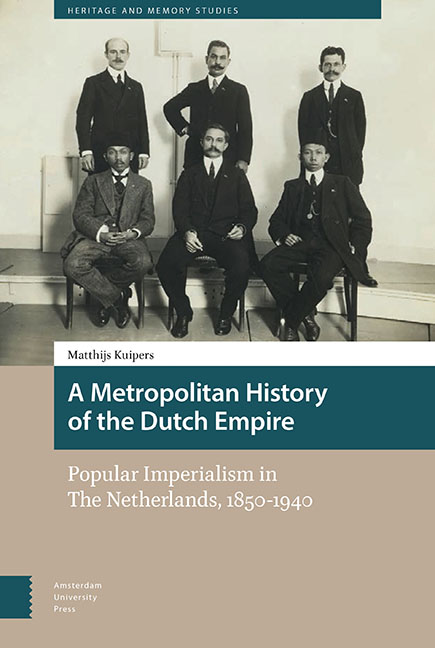Book contents
- Frontmatter
- Contents
- List of Figures and Tables
- List of Abbreviations
- On Names and Terminology
- Introduction: The Still Waters of Empire Run Deep
- 1 Food and Indifference: A Cultural History of the Rijsttafel in the Netherlands
- 2 Indonesians and Cultural Citizenship: The Metropolitan Microcosm of Empire
- 3 Schools and Propaganda: History Books and Schools as Sites of Imperial Campaigns
- 4 Scouting and the Racialized Other: Imperial Tropes in the Dutch Scouting Movement
- 5 Missionary Organizations and the Metropolitan Public: The ‘Inner Mission’ and the Invention of Mission Festivals
- Conclusion: A Fragmented Empire
- Sources
- Index
4 - Scouting and the Racialized Other: Imperial Tropes in the Dutch Scouting Movement
Published online by Cambridge University Press: 06 May 2022
- Frontmatter
- Contents
- List of Figures and Tables
- List of Abbreviations
- On Names and Terminology
- Introduction: The Still Waters of Empire Run Deep
- 1 Food and Indifference: A Cultural History of the Rijsttafel in the Netherlands
- 2 Indonesians and Cultural Citizenship: The Metropolitan Microcosm of Empire
- 3 Schools and Propaganda: History Books and Schools as Sites of Imperial Campaigns
- 4 Scouting and the Racialized Other: Imperial Tropes in the Dutch Scouting Movement
- 5 Missionary Organizations and the Metropolitan Public: The ‘Inner Mission’ and the Invention of Mission Festivals
- Conclusion: A Fragmented Empire
- Sources
- Index
Summary
Abstract
In Britain, the Scouting movement founded by Lord Baden-Powell constituted a pedagogical revolution: rearing children to become lawabiding, class respecting, and imperially minded citizens, it employed storytelling, make-believe, games and sports to achieve is, as opposed to the more stifled approaches of youth associations prior to the advent of Scouting. In this chapter, the early history of the Scouting movement in the Netherlands is read against its British source of inspiration. The Dutch Scouting organizations remained more traditional in their pedagogical approach, and employed only a small amount of Baden-Powell's innovations. Two different strands of imperial ideology – a romantic, conservative worldview, in the British case, and a liberal, development-oriented imperial ideology in the Dutch case – lie at the heart of these difference. Yet, both these ideologies left little room for subaltern agency in the empire, as the racialized stereotypes that were so prevalent during the 1937 World Scout Jamboree show.
Keywords: scouting, Jamboree, race
This chapter examines the extent to which the Scouting movement's Dutch offshoot functioned as a tool of empire in the same way the British organization founded by Lord Baden-Powell did. The Dutch organization copied the imperial obsessions and anxieties of the British original, and produced some of its own, but a close inspection of the material shows that imperial ideologies embraced by the two movements differed. If the British organization revolved around a time-frozen and heavily distorted image of colonized peoples, whose masculinity had to inspire the ‘frail’ English youth and make them into competent administrators and soldiers for the empire, the Dutch organization, which was founded in the 1910s, showed an altogether different picture. The empire was not a place to inspire Westerners, as it was in Baden-Powell's conception, but a place where Westerners went to conquer, administer and rule. To Baden-Powell's stories about Zulu masculinity rites (appropriations of actual Zulu culture, at best ‘reinterpretations’ of things he witnessed when he served in the Boer War), the Dutch scoutmasters added worn-out nineteenth-century textbook stories about Jan Pieterszoon Coen as the seventeenth-century founder of Dutch rule in the Indonesian archipelago.
- Type
- Chapter
- Information
- A Metropolitan History of the Dutch EmpirePopular Imperialism in the Netherlands, 1850-1940, pp. 145 - 178Publisher: Amsterdam University PressPrint publication year: 2022



